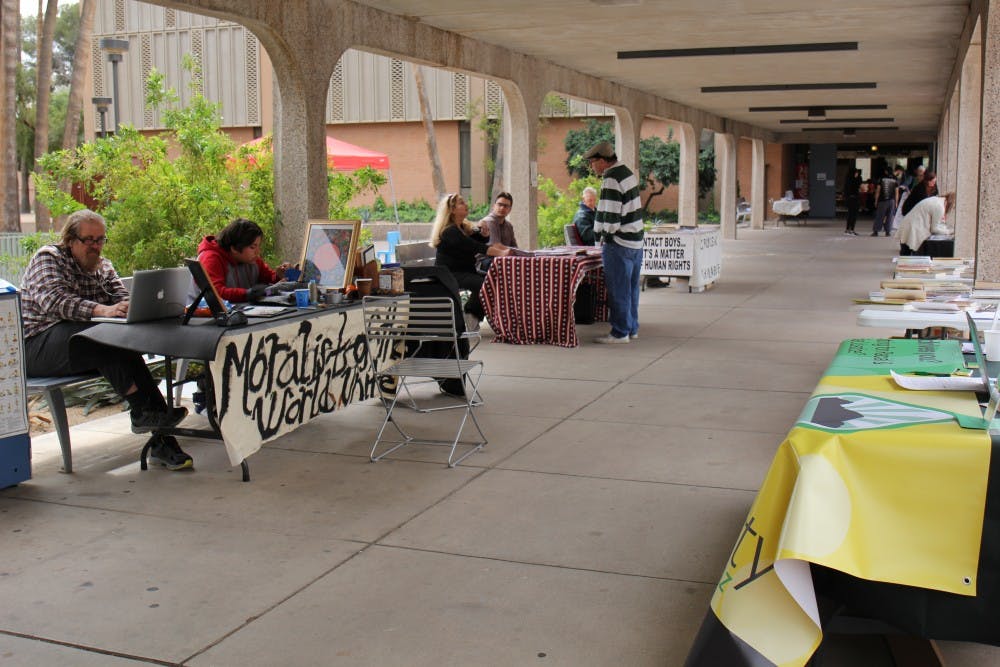Tall trees donned with string lights encircle a large patio. The court yard, a mix of concrete and dirt, curves on one side to make a pit in the ground where a microphone, two drums and an acoustic guitar stand.
Last week, three poets stood at the microphone and spoke about sexual assault prevention and struggles that the LGBT community can face. The congregation and performances at the Phoenix Hostel kicked off the start of the Local to Global Justice’s 16th annual Forum and Festival.
Elizabeth Swadener, a co-founder of L2GJ at ASU and a professor at the School of Social Transformation, said she considers herself the “group’s historian” because she has been one of the advisors for the groups since its inception in August 2001.
Swadener said the organization has always been about having a space for local and regional activists to gather, exchange information and connect “local issues to global struggles.”
Swadener also said the group is unique because it emphasizes multiple issues regarding human rights, saving the planet and freedom of speech.
“We’re the opposite of a single-issue group,” she said. “We are a big umbrella or a large tent.”
Swadener said she got involved with the group after three ASU students from three different majors approached her with the initial concern of globalization.
But after the 9/11 attacks, the group changed its focus, Swadener said.
“We shifted the focus pretty quickly away from fair trade to talking more about preventing wars and making peace and not having civil liberties restricted in the name of post-9/11,” she said.
Swadener said L2GJ recently held a local panel on immigrant rights and the fear of mass-deportation.
“We also want to call attention to the role that folks in the U.S. have in consuming drugs that are fanning the fires of the narcotrafficking,” she said.
Local To Global @LTGJ Leads Upcoming Community Events https://t.co/uihVuCwecE Consciousness Calendar #think #PHX #Learn #share #gather
— ModernTimesMagazine (@ModernTimesMag) February 24, 2017
L2GJ's main event — which they spend the most time planning — is their forum and festival.
Swadener said it used to be called a teach-in because back in the 1960s during the Vietnam War, people would gather to learn about a variety of social and political issues.
Swadener also said it’s very exciting to plan and organize events for L2GJ.
“It means that I get to be constantly inspired by our students, undergraduates and graduates, who are also activists and leaders,” she said.
Jeremy Omori, a graduate student studying Social and Cultural Pedagogy and a program coordinator for L2GJ, helps advertise and contact people for the organization.
“Our goal with the organization is to bring together community members, students, as well as faculty members to come together and talk about issues and best practices for social justices,” he said.
Omori said the club is a great resource for student activists to network and get a bit of exposure.
“In my opinion, it’s a wonderful way to get involved in all levels of activism, especially for those who might be intimidated by the whole idea of activism, but they want to do something,” he said.
Omori said while L2GJ has left-leaning social activism, the organization is not just for liberal-minded people.
“It’s not just a group of your left-wing hippies,” he said. “We’re as inclusive as possible. We do value a diverse group of people.”
Katherine Hofland, a public service and public policy senior, read a few of her poems about sexual assault at the L2GJ forum and festival last weekend.
While she is not a member of L2GJ, she said she advocates for sexual assault prevention through her poems.
“I am super invested in social justice,” she said. “I work in sexual violence prevention, so it’s cool to combine two different things that I love so much: sexual violence prevention and poetry.”
Hofland was originally a creative writing major but switched when she got more involved in social justice and sexual violence prevention.
“It’s just something I’m really passionate about,” she said. “I think it’s just a prominent issue on college campuses. It’s something that isn’t paid enough attention to.”
Reach the reporter at anbuechl@asu.edu or follow @alexa_buechler on Twitter.
Like The State Press on Facebook and follow @statepress on Twitter.




